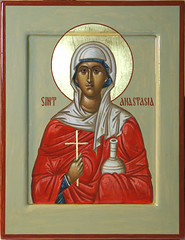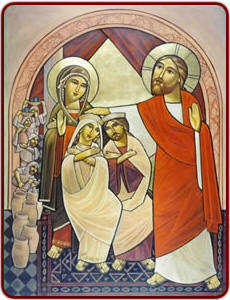My Wife the Saint
I’ve taken a little flack for attributing saintly qualities, on intimate occasions, to my wife. But I still hold to it. The thing is, it’s easy to look at someone and see their faults. But I don’t think we’re supposed to be thinking less of someone because of their weaknesses, but rather we are to think more of them because of the strength of their repentance.

- Image by jimforest via Flickr
What I see is my wife remembering her dependence on God, refraining from attack at some cost to herself, when others try to injure her, and asking for others’ wellbeing. I also see all the weaknesses that married people see in each other, and no one outside of that marriage can really understand, though looking in they may think they do. But what is that the fathers have taught us? To see our own failings, not those of others. To say “it is my fault” when there is antagonism, or any time we think we see a frailty – to say “It’s me. I made her stumble”. To count others more worthy than oneself. Isn’t this the struggle most especially pursued in the form of marriage.
I think two things about marriage, more than I think much of anything about it:
1. It’s not the same as a committed “relationship”. You can’t toss in your experience in relationships with that of a marriage. I once thought I could, but marriage, religious marriage, is a form of martyrdom, which is why the crowns are worn during the betrothal. It is not comparable to ‘living together’, ‘dating’, or being in a LTR (long term relationship). A lot of people shacking up may not want to hear that. I really don’t care. It’s so.
2. No marriage is like any other marriage in the things that count. Just like no martyrdom is the same as any other. There’s no guidebook to marriage, seven principles of marriage, or handy dandy handbook to marriage. Which is, again, one of the reasons you don’t get to understand it by merely living together in a committed relationship. To reduce it to sharing a dwelling or to commitment is to fail to understand it altogether, and this is one reason there’s so much advice out there, and most of it is garbage. Marriage understood as a religious mysterium, is beyond reduction to a set of propositions. The way of a particular man with a particular woman is unknowable, incomparable, and without reference in the way of another man with another woman, at its core. Sure, we can get some advice, take a lesson or two, but that’s not really the same thing. So when people try to say “this is how a marriage is supposed to work”, I just automatically change the intellectual channel. Once the starting place is that marriage is a generic relationship consisting of propositions for success, like building a business plan, I know it’s not my marriage we’re talking about. What you’re left with, in that whole millieu, is marriage products. Something marriage-ish. A heat and eat marriage formula with a full serving of vegetables in every glass. Yeah, right. I’m sure there are many books that married couples have found helpful, but they’re helpful only when they are interpreted, evaluated, and applied within the context of something utterly unique. Which is why some book or seminar or whatever might be excellent for you and crap for us. You just don’t have a point of comparison for our marriage, neither does that author or speaker, and nor does anyone else. And we don’t have a point of reference for your marriage, either. The deep things, the things that truly matter, which we say is salvation by marriage, marriage as a vehicle of union with God, can only be understood on a personal level and from within.
In the same way, we assert that my salvation is not your salvation. In fact, we are so unique that even our sins have never been committed by anyone else, ever. My pride is not your pride. This disturbs those who offer salvation products, salvation heat and eat formulas, and salvation plans, packages, and programs, which are somehow usually intricately connect with either fundraising or private affiliation. Not that I think salvation is possible apart from the Church – to assert that is heresy. But salvation is also ultimately unique – as ultimately unique as each person is. And salvation as the only reason for marriage (it is the only reason), indicates that marriage is also ultimately unique. Or another way of putting it: just as our anthropology insists that all persons are ultimately unique, so our mysteriology must assert that each union of unique persons must likewise be unique. As we are uniquely saved individually, so we are uniquely saved corporately.
Based on these two points, I really don’t take into account other people’s evaluations of my spouse and utilize them as part of my understanding of her. There’s no need. They don’t see when and how she prays. I do. They don’t see how she handles problems that are discussed in the vault of our intimacy. I do. They see only the outcomes of those things, the actions viewed from an external vantage point. A place of more limited understanding. And besides, why take into account the thoughts of someone about your own spouse who isn’t doing what you are supposed to be doing – seeing only their own faults, not hers, seeing only their own weaknesses, and taking hers upon themselves. Judgment is hypocrisy. And judgement for judgment is ultimate hypocrisy. It is better not to listen. Hear only the inner voice saying “I am at fault. Not the other person. By that person’s prayers save me.”
So what’s the point? Well, just this. The Faith teaches us to prefer one another to ourselves. To deem the other superior. And this doesn’t work if it’s just lip service or illusion. The only road to this is either to understand and acknowledge for real the depth of one’s own sin, or to see the piety at work in the other person, God’s grace abiding on them and in them, as surely it does. Or both. And whether then you are in the inner chamber of confession or the inner chamber of marriage, others cannot quite see what you see. They may see something similar for similar reasons, indeed – they may deem the other person to be indeed holy – but we only need to concern ourselves with our own vision. The alternative is blindness.
I guess what I’m saying is that in my marriage, I find it beneficial to see my wife’s example, in many ways, and to have it as a point of reference in my own unworthiness. And while I don’t presume to offer anyone marital advice, in which I’m not really a believer, I like the advice of the fathers for all of us, that we venerate one another as the icons of Christ. I find it useful in my marriage. If you find it applicable or useful in yours, kudos. It’s just what I’m thinking about. And I think if my wife were not Orthodox, I would find it just as helpful to see when she is merciful, or just, or peaceable, and recognize this also as impossible except for the uncreated Grace of God sustaining her life as it does all of us. To me, my wife is a Saint, and as we are taught to say of all men, I say of her “by her prayers save me”. What other attitude is right for a married man to have? So naysay all anyone wants, it can only come from outside of a context where it has little relevance. My wife is my icon, and the failings are mine.

 I once told a friend that I was setting out on a journey to learn to love my wife. I believed that if I learned to love my wife, I would learn to love others. And if I can’t learn to love my wife, I told him, then I fear I will never learn to love anyone. My friend periodically, after long periods of time, writes to ask me if I’ve learned to love my wife. And I have always written back, “Not yet. I think it will take a long time.” Recently, I wrote to him to say:
I once told a friend that I was setting out on a journey to learn to love my wife. I believed that if I learned to love my wife, I would learn to love others. And if I can’t learn to love my wife, I told him, then I fear I will never learn to love anyone. My friend periodically, after long periods of time, writes to ask me if I’ve learned to love my wife. And I have always written back, “Not yet. I think it will take a long time.” Recently, I wrote to him to say: